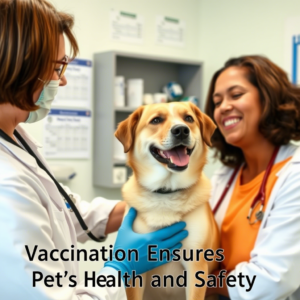Understanding the Winter Risks for Pets
As the winter months approach, it is essential for pet owners to recognize the various risks that their pets may face during this cold season. Lower temperatures can significantly affect the health and well-being of pets, leading to serious conditions such as hypothermia and frostbite. Hypothermia occurs when a pet’s body temperature drops dangerously low, and this risk is heightened in smaller dogs or those with thin coats. Symptoms may include shivering, lethargy, and difficulty walking. On the other hand, frostbite can harm exposed skin, especially on the paws, ears, and tail. If not addressed promptly, these conditions can lead to severe health complications.
Moreover, winter outdoor activities often come with a set of unique hazards for pets. Ice can be deceptively slippery and hazardous, causing pets to fall or injure themselves. Additionally, snow accumulation can obscure dangers hidden beneath the surface, such as sharp objects or holes. It is important for pet owners to secure their yards, ensuring that their pets have a safe play area free from these risks.
Another considerable concern is the use of chemicals during winter months. Substances such as antifreeze and ice melt products can be toxic to pets if ingested. Antifreeze, in particular, is known for its sweet taste, which can attract animals but can lead to severe poisoning. Therefore, pet owners must be diligent about cleaning spills and choosing pet-safe alternatives when possible.
Being proactive in safeguarding pets during the winter is paramount. Education about the risks associated with cold weather can significantly improve a pet’s quality of life during the winter season. Pet owners should stay informed about these challenges and take the necessary precautions to ensure their pets remain healthy and safe throughout the colder months.
Essential Winter Care Tips for Your Pets
As winter descends, it is crucial for pet owners to ensure their furry companions are well cared for during this challenging season. Extremely low temperatures can pose significant risks to pets. Therefore, providing adequate shelter is paramount. Pets should have access to warm, dry areas that are protected from the harsh elements, whether it’s indoors or in a well-insulated outdoor shelter. Ensure that the shelter is free from drafts and large enough for the pet to stand, turn around, and lie down comfortably, yet small enough to retain body heat.
Nutrition plays a vital role in helping pets withstand cold weather. Just as humans adjust their diets in winter, it is essential to ensure pets receive proper nutrition. Consider providing food that is higher in calories, as pets may require more energy to maintain their body temperature. Always consult with your veterinarian for tailored dietary recommendations during the winter months to address any specific needs based on your pet’s age, breed, and health status.
Regular veterinary check-ups are crucial during winter. Cold weather can exacerbate various health issues, so staying proactive about your pet’s health is advisable. Vaccinations, parasite control, and overall wellness assessments should be prioritized to avoid potential complications that arise during winter months.
When it comes to outdoor activities, limiting outdoor time during extreme weather is essential. Short walks to relieve themselves should suffice when conditions are icy or below freezing. Additionally, attention must be given to grooming; keeping your pet’s fur at an appropriate length can prevent matting and reduce the risk of frostbite on ears, tails, and paws. Regularly checking and cleaning your pet’s paws after outdoor time can help prevent damage from ice, salt, and chemicals used on roadways.
For further reading about enhancing your pet’s winter diet and care strategies, please refer to our articles on pet nutrition and winter grooming tips.
Common Winter Health Issues in Pets and Their Solutions
As winter approaches, pets are exposed to various health challenges that can affect their well-being. One prevalent issue is respiratory problems, which can stem from cold weather and indoor heating. Symptoms may include persistent coughing, sneezing, or nasal discharge. To alleviate these symptoms, pet owners should ensure their pets are kept warm, limit exposure to cold drafts, and consult a veterinarian for advice on preventative care and potential treatments.
Dry skin is another common concern during the winter months. The combination of low humidity and central heating can lead to dryness, which manifests as itching, flaking, and irritation. Pet owners can counteract this problem by using humidifiers within their homes and incorporating omega fatty acid supplements into their pets’ diets. Additionally, regular grooming can help remove dead skin cells and distribute natural oils throughout the coat, promoting skin health.
Extreme weather changes can also increase anxiety levels in pets. Signs of stress might include excessive barking, destructive behavior, or withdrawal from their usual activities. It is crucial for pet owners to observe their animals closely and provide a safe space where they can retreat. Engaging in regular exercise and interactive playtime can help alleviate anxiety symptoms. For more severe cases, consulting a veterinarian about behavioral therapies or calming supplements may be beneficial.
Recognizing these health issues early is vital for ensuring the comfort and safety of pets during winter. It is essential to monitor any behavioral changes, as they can serve as indicators of discomfort or stress. By taking preemptive measures and seeking prompt medical attention, pet owners can significantly enhance their fur companions’ quality of life throughout the colder months.
FAQs
To address common concerns regarding winter health issues, pet owners often ask about specific symptoms to look out for and preventive care strategies. Being informed can help mitigate risks and maintain the health of pets during the winter season.
Conclusion: Keeping Pets Safe and Comfortable This Winter
As the winter months approach, it is crucial for pet owners to recognize the unique challenges that their furry companions may encounter during this season. The colder temperatures, icy conditions, and limited daylight can pose significant risks to pets, potentially impacting their health and overall well-being. Throughout this article, we have discussed various risks such as frostbite, dehydration, and the dangers of salt and other chemicals used for de-icing, as well as the need for suitable attire and proper grooming.
Being proactive in pet care is essential. By adapting routines and taking preventative steps, pet owners can help safeguard their pets against winter hazards. For instance, ensuring that pets have a warm and comfortable shelter, monitoring their exposure to cold weather, and providing continuous access to fresh water are vital measures. Additionally, considering specialized winter gear for pets, such as coats and booties, can further enhance their comfort during outings in wintry conditions.
Moreover, regular veterinary check-ups can offer insights specific to a pet’s needs during the winter months. Consulting with a veterinarian about dietary adjustments or preventative care can also significantly contribute to a pet’s health and resilience against seasonal illnesses. Pet owners are encouraged to educate themselves on the signs of cold stress and the procedures necessary to address them effectively, reinforcing the importance of vigilance.
By being informed and prepared, pet owners can ensure that their beloved animals remain both safe and comfortable throughout the winter season. We urge readers to implement the tips discussed and actively prioritize their pets’ well-being, creating a warmer, safer, and more enjoyable winter experience for all furry friends.

